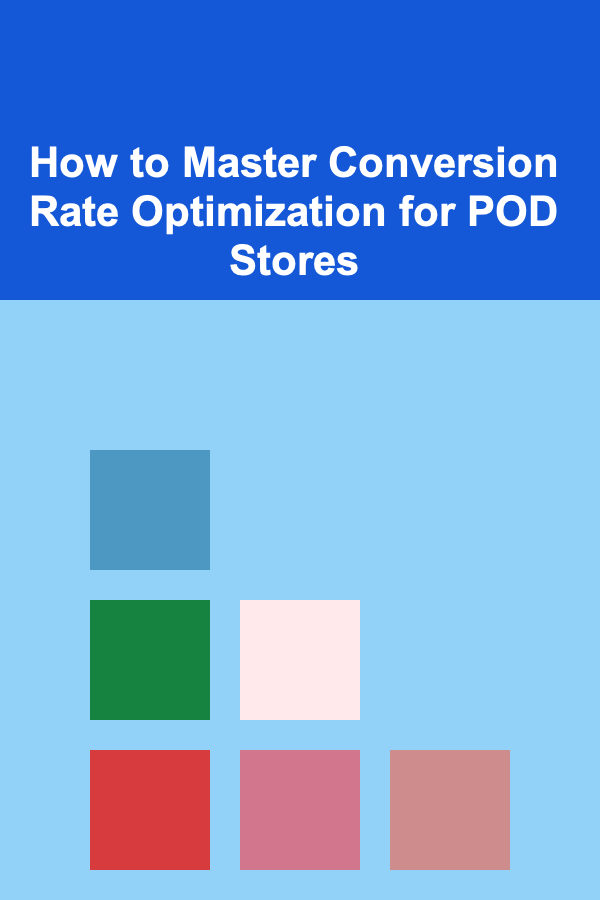
How to Master Conversion Rate Optimization for POD Stores
ebook include PDF & Audio bundle (Micro Guide)
$12.99$9.99
Limited Time Offer! Order within the next:

In today's fast-paced eCommerce world, success doesn't just come from attracting visitors to your online store; it hinges on turning those visitors into customers. Conversion Rate Optimization (CRO) is a vital aspect of this process, and for Print-on-Demand (POD) stores, it's an essential tool to maximize revenue without increasing traffic. POD stores have a unique advantage in terms of low overhead and the ability to customize products without upfront inventory costs, but they also face unique challenges when it comes to converting visitors into paying customers.
This article will explore the concept of Conversion Rate Optimization in-depth, specifically for POD stores, and provide actionable strategies to help you master CRO. Whether you're just starting out or have an established POD store, understanding and implementing effective CRO strategies can significantly improve your profitability.
Understanding Conversion Rate Optimization (CRO)
Before diving into how to master CRO for POD stores, it's important to understand what Conversion Rate Optimization is and why it's crucial for online businesses.
What is CRO?
CRO is the practice of optimizing your website to increase the percentage of visitors who complete a desired action. This could be making a purchase, signing up for an email list, downloading a guide, or any other goal that brings value to your business. The "conversion" refers to turning a visitor into a customer or lead.
In eCommerce, CRO primarily focuses on increasing the percentage of website visitors who make a purchase. For POD stores, this is even more important as they operate on slim profit margins and need to ensure that every visitor has the potential to generate revenue.
The Importance of CRO for POD Stores
POD stores are unique in that they offer custom-made products, which means that product creation and delivery happen only once an order is placed. The ability to effectively market and convert visitors is therefore key to profitability. For POD store owners, focusing on CRO helps maximize the return on the traffic they already have, which is often more cost-effective than just increasing website traffic.
For example, if your store has a 1% conversion rate, this means that for every 100 visitors, only one person makes a purchase. By improving your conversion rate to 2%, you double your revenue from the same amount of traffic. In the competitive world of POD, this can make a significant difference.
Key Strategies to Master CRO for POD Stores
To master Conversion Rate Optimization for your POD store, you need to focus on multiple factors ranging from the design and user experience of your store to your sales strategies and customer interactions. Below are some key strategies to help improve your store's conversion rate:
1. Optimize Your Website Design and User Experience
First impressions matter, and the design and user experience (UX) of your POD store are critical. A well-designed website can make customers feel comfortable and confident in their purchase, while a poorly designed one can create frustration, leading to abandoned carts and lost sales.
Simple, Clean, and Professional Design
Your website should have a clean, professional design that reflects the quality of your products. Avoid clutter and distractions that might take focus away from your product offerings. Remember, your goal is to guide visitors to make a purchase, so make sure they can easily find what they are looking for.
- Navigation: The navigation should be simple and intuitive. Visitors should easily understand where to find products, how to check out, and what the return policies are.
- Responsive Design: Your site should work seamlessly on mobile devices. A significant portion of eCommerce traffic comes from smartphones, so having a mobile-friendly website is no longer optional.
- Loading Speed: A slow-loading website can result in high bounce rates. Aim for a website that loads in 2-3 seconds or less.
Clear Call-to-Actions (CTAs)
Every page on your website should have a clear and noticeable CTA, whether it's "Add to Cart," "Shop Now," or "Learn More." The CTA buttons should stand out and guide users toward completing their purchase.
Use contrasting colors to make them pop, and place them in prominent positions on the page.
2. Enhance Product Pages for Better Engagement
Product pages are where visitors make the decision to purchase, so optimizing these pages is crucial to improving your conversion rate.
High-Quality Product Images
Since customers can't physically touch your products in a POD store, high-quality images become critical. Include multiple images of each product, showing it from different angles and in various settings to give customers a better idea of what they're buying. You should also include zoom functionality to allow potential buyers to inspect the product closely.
Detailed Product Descriptions
Your product descriptions should provide enough detail to help customers make an informed purchasing decision. Highlight the benefits, materials, size options, and any customization features. The description should be clear, concise, and persuasive. Avoid overly technical language unless it's necessary.
Customer Reviews and Testimonials
Social proof is one of the most powerful conversion tools. Incorporate customer reviews and testimonials on product pages to show how previous buyers have been satisfied with their purchases. Positive reviews build trust and can overcome potential objections.
Customization Features
Since POD stores specialize in custom products, make sure your store's customization options are easy to find and use. Provide live previews of custom designs so that customers can see their creation before they purchase.
3. Simplify the Checkout Process
The checkout process is one of the most critical stages in the conversion journey. Complicated checkout procedures can lead to cart abandonment and lost sales.
Guest Checkout Option
Not all customers want to create an account when they make a purchase. By offering a guest checkout option, you reduce friction in the purchasing process, making it easier for customers to complete their transactions.
Multiple Payment Options
Offer multiple payment methods, such as credit/debit cards, PayPal, and Apple Pay, to ensure that customers can pay in the way that's most convenient for them.
Clear Pricing and Shipping Information
Transparency is key. Make sure your pricing is clear, and provide upfront details on shipping costs, delivery times, and return policies. Unexpected costs at checkout are a major reason for cart abandonment.
Easy Navigation for Cart Changes
Allow customers to easily edit their cart (e.g., changing quantities, removing items) during the checkout process. This will make the experience smoother and less frustrating.
4. Offer Time-Sensitive Discounts and Urgency Cues
People are motivated by urgency, especially when they feel like they might miss out on a good deal. By creating a sense of urgency, you can push potential buyers to complete their purchase sooner.
Limited-Time Discounts
Offer discounts or special deals for a limited time to encourage customers to act quickly. Display the countdown timer prominently on the product pages and at checkout.
Low Stock Alerts
If your products are low in stock, show a warning (e.g., "Only 3 items left in stock"). This creates a sense of urgency, prompting customers to purchase before they miss out.
5. Retargeting and Abandoned Cart Recovery
Even with the best website and checkout experience, some customers will abandon their carts before making a purchase. Retargeting is an essential strategy to bring those customers back.
Abandoned Cart Emails
Use abandoned cart email sequences to remind customers about the items they left behind. Offer a discount or incentive in the follow-up emails to encourage them to complete their purchase.
Retargeting Ads
Retarget visitors who abandoned their carts using ads on platforms like Facebook or Google. Display ads featuring the products they viewed, keeping your store top of mind.
6. Focus on Building Trust and Credibility
Customers need to feel confident that they are making a secure purchase. Trust signals are an important part of CRO, especially for new POD stores.
Security Certifications
Ensure your website has SSL certificates and display trust badges (e.g., secure checkout, payment options, etc.) on the checkout page.
Clear Return and Refund Policy
Provide a clear and fair return and refund policy to reassure customers that they can easily return products if they are dissatisfied.
7. Continuous Testing and Optimization
Conversion Rate Optimization is not a one-time effort; it's an ongoing process. Regularly test and optimize different elements of your website to see what works best for your audience.
A/B Testing
Run A/B tests on various elements of your store, such as CTA buttons, product page layouts, and checkout processes. Testing different versions of these elements helps you determine what resonates best with your visitors.
Analyze Analytics
Use tools like Google Analytics to track user behavior, identify drop-off points, and gain insights into how visitors interact with your site. This data can help you make informed decisions about where to focus your optimization efforts.
Conclusion
Mastering Conversion Rate Optimization for POD stores is an essential strategy for increasing revenue without increasing traffic. By focusing on user experience, enhancing product pages, simplifying checkout, creating urgency, and building trust, POD store owners can significantly improve their conversion rates. Additionally, continuous testing and optimization will help ensure that your store remains effective in turning visitors into loyal customers.
By implementing these CRO strategies, you will not only increase sales but also improve customer satisfaction and loyalty, which is crucial for long-term success.

How to Invest in International Markets and ETFs
Read More
How to Maintain Your Home's Insulation for Energy Efficiency
Read More
How to Organize Your Digital Music Library for Easy Listening
Read More
How to Store Utensils Safely for Child-Friendly Kitchens
Read More
How to Master Stealth Kills in Action-Adventure Games
Read More
How to Plan a Twitch Schedule for Maximum Viewer Engagement
Read MoreOther Products

How to Invest in International Markets and ETFs
Read More
How to Maintain Your Home's Insulation for Energy Efficiency
Read More
How to Organize Your Digital Music Library for Easy Listening
Read More
How to Store Utensils Safely for Child-Friendly Kitchens
Read More
How to Master Stealth Kills in Action-Adventure Games
Read More